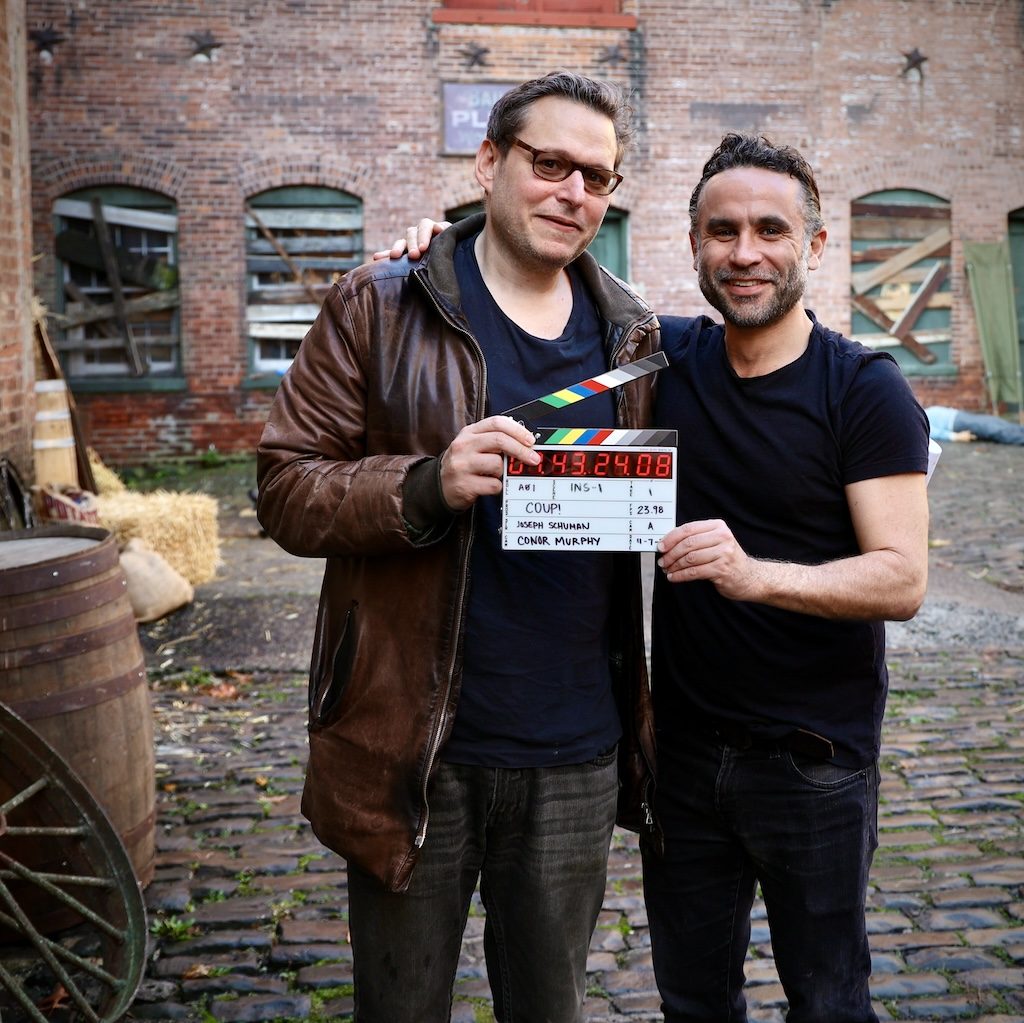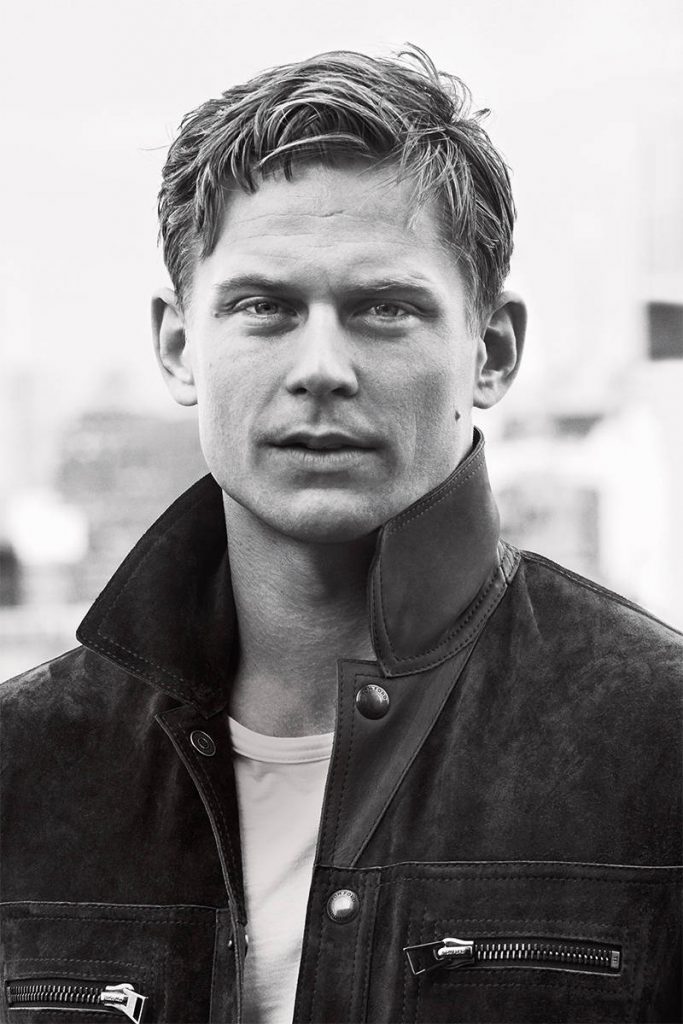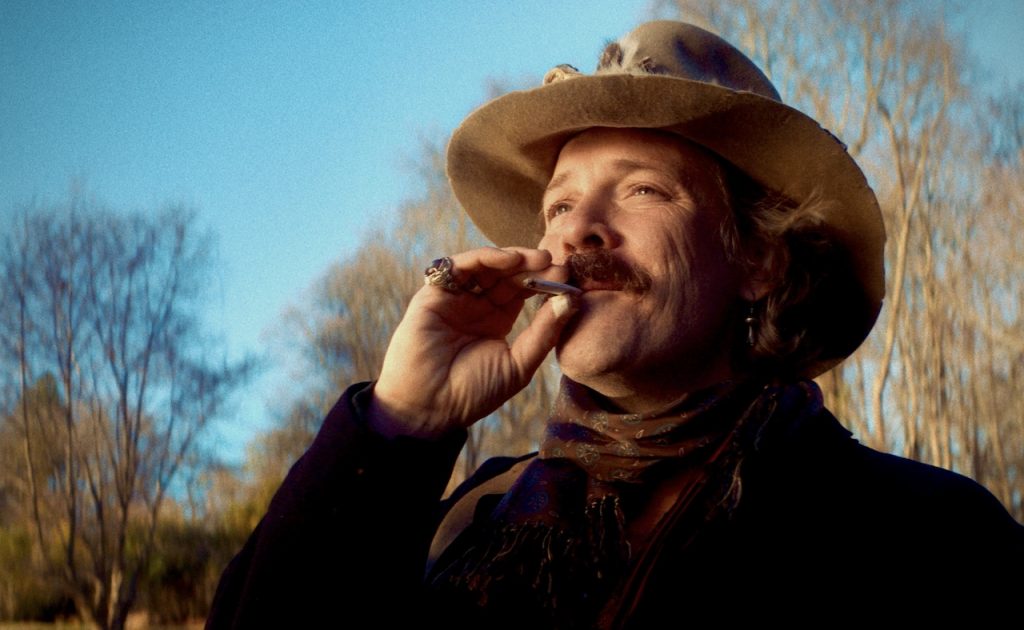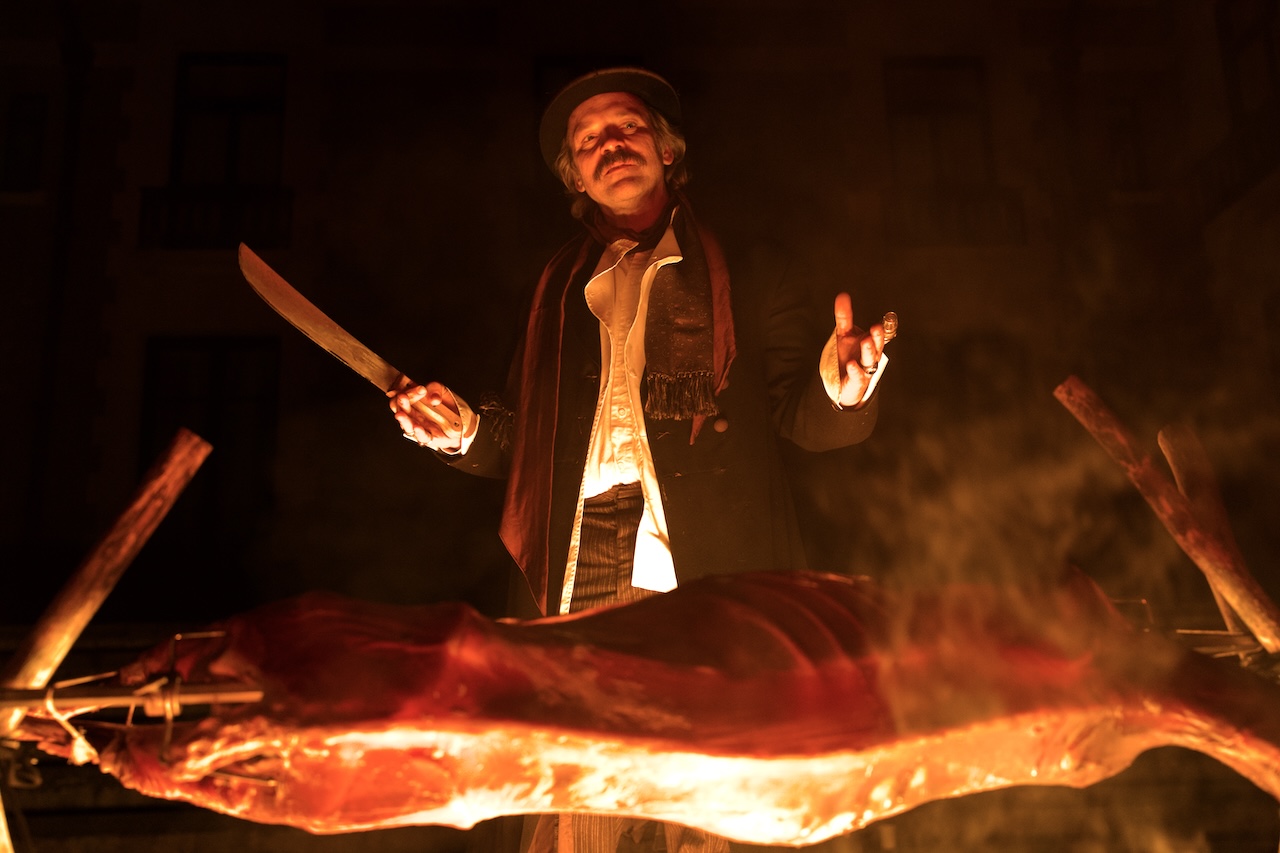In their director’s statement, writer/ director duo Austin Stark and Joseph Schuman state, “Broad scale emergencies have a way of exposing the perennial vulnerability of the affluent: their dependence on the working class”.
The setting of their film COUP! is eerily familiar. It’s 1918 and the Spanish flu has taken over. The wealthy have fled to their luxurious homes to isolate, relying on their staff to ensure they are fed, their house is cleaned, and they are generally “uninconvenienced” throughout the duration of the health crisis.
Stark and Schuman’s story is not about COVID. While having experienced a global pandemic in very recent history may make the subject matter feel particularly timely, the themes date back hundreds of years. At its core, COUP! is about class struggle and the upstairs/ downstairs tension that doesn’t seem to be going anywhere anytime soon.
An official selection of the 2023 Venice Film Festival, the movie stars Peter Sarsgaard as Floyd Monk, a suspicious character who poses as a cook and finds his way into the home of wealthy journalist Jay Horton (Billy Magnussen) and his family as they isolate at their estate. Encouraging the other staff to begin speaking (and acting) up against their “downstairs” way of life, Monk’s actions soon trigger a full-on feud with his employer, and the battle for control rapidly escalates.

Joseph Schuman and Austin Stark
Creative Screenwriting Magazine spoke with both Austin Stark and Joseph Schuman, as well as Billy Magnussen (who helms HappyBad Bungalow Productions) about the themes and social issues COUP! playfully tackles and why it became a passion project for all involved.
Joseph and Austin, I understand the two of you have been friends for many years. What made you each turn to screenwriting?
Joseph: Speaking for myself, I think film is just the grandest form of storytelling. It has that operatic quality that combines all forms of media into one awesome spectacle. That’s just so appealing as a storyteller.
Austin: I echo that sentiment. For me, I was an English major at Georgetown and had a good friend who was at NYU. At that time, Georgetown didn’t have many filmmaking classes. You could do a concentration – which is what I ended up doing – but there was no major. I came home one summer and teamed up with my friend and we wrote a script together and that’s what got me hooked. It was a great time. Terrible script! But we had a lot of fun. And I’ve been writing ever since. I see myself just as much as a screenwriter as I do a director.
Billy, how did you become introduced to this unique project and what made you want to be involved with it?
Billy: In the industry, there are times when scripts come across my desk – I get to read them. They’re beautiful and I want to be involved with them. Joseph and Austin gave me the opportunity to read this script and I fell in love with their writing so fast. I thought, this is great, these are the types of topics I want to talk about. This is a smart person’s film. It’s a film to challenge yourself with.
They invited me to be a part of it with my production company HappyBad Bungalow and offered me the role of Jay. And we started building the film from there, looking for locations, looking for cast. We slowly built it out and it came together fast on a micro budget. There were days I was carrying the lights in and moving camera equipment around. It was an “all hands on deck” production. Peter gave the same energy every day.

Billy Magnussen
It’s a little piece of work that I’m just so proud of. I would say I’ve been in some bigger films, but stuff like this warms my heart because of the sense of community and the passion people showed up with. I couldn’t be more grateful for that.
Honestly, this project was made with love. People are scared of being suffocated by big studios and algorithms that tell us what people want to watch and digest, which is sometimes, for lack of a better word, shit. How do you become an artist unless you help elevate other artists? That’s kind of HappyBad’s mission. We’re a company based on artists helping artists tell amazing stories, so that global audiences can experience the healing power of entertainment.
Tell me about your lead characters in this film, Floyd Monk and Jay Horton.
Joseph: So with this story, we broke a cardinal rule in terms of not having a conventional hero and not having a conventional villain. One of the things we set out to do from the outset was play with audience identification and what you know about these characters who you think might be the conventional good guy and bad guy. That’s speaking generally. More specifically, Peter Sarsgaard plays Floyd Monk, who is a grifter, someone who, to all appearances, has just killed someone. He’s someone who inserts himself into this wealthy family led by Billy Magnussen’s character by pretending to be their cook. Without giving anything away, things go pretty wild from there.
How would you describe the tone of this film?
Billy: It feels a little old school to me in a weird way… as in, an older form of filmmaking where you actually sit with the characters a little bit. You think, “I want to live with the character. I want to understand the character I want to be with him a little more, go through the emotions and put myself in their situation and figure out how to respond.” Because these characters are not villains. They might be horrible people! But you’ve probably made bad decisions in your life and I’ve made bad decisions in my life… but we’re not villains.
The film is satire set in 1918… if it’s satirical to be showing the hypocrisy of social class and of what people say they’ll do when compared to what they actually do. That’s what we’re aiming for.

Peter Sarsgaard (Floyd Monk)
But the Mona Lisa – and I’m not comparing our film to the Mona Lisa! – is just a piece of art. It’s a frame. How do you connect with it? It’s honestly who’s looking at it and how they relate to it. That’s the beautiful thing about art – it’s the digesters’ interpretation of it that means everything.
Is capitalism the true villain of the story?
Austin: I would say so. There’s also performative activism, which is something we’re taking a shot at. There are multiple themes and in terms of performative activism. It’s not even a matter of referring to a specific party or left or right. It’s more something that we see in various people and facets of life these days that we’re aiming at.
Joseph: To add to that, I would say that in the same way there’s no clear-cut hero and villain and audience expectations are played with in the film, capitalism certainly does come across as the villain, but so does socialism. Each of those things are explored in this Lord of the Flies civilization. The story takes place during the Spanish flu, but that really serves as this Tempest that gets our characters marooned on a deserted island. So we explore what happens in this upstairs, downstairs master/servant relationship when the social order breaks down, if only for a brief moment.
Is “entitlement” a major theme you explore?
Joseph: Entitlement, I think in many ways, is the adversary of all of these characters in different ways. The have-nots feel entitled to more, even if their claims aren’t necessarily lawful, and the haves feel entitled to what they have. With Jay, that feeling leads to all forms of guilt, because in a way, he truly does want to make the world a more egalitarian place. But he’s born a bazillionaire, so it gives him all of this inner conflict and dimensionality.
Austin: One of the characters that we didn’t envision as being entitled is Sarah Gadon’s character and Jay’s wife, Julie. We always saw her as the moral center of the film, and we’re almost seeing the film through her eyes. That was something that we designed in the script stage. She’s constantly being pushed and pulled by these two men.
Can you speak to the experience of writing and filming this, seeing it through now to where it is?
Austin: We tried to work with people that we felt were very passionate about the material. Making independent films is difficult and you want people who are going to go to war with you, and who are going to put a smile on their face even if they’ve been on set since 5:00 AM and it’s now 9:00 PM. So we tried to find people who wanted to be there, who understood our vision and our passion for the material. We think that that ended up being reflected in the film.
Billy, tell me about working with Austin and Joseph.
Billy: It was so good; they are so smart and entertaining. This was a passion project and their baby. We had other people working on it to get the best vision and collaborating with them was exciting because they were always open to discussion. They were always growing the idea and figuring it out better. I always hope to work with people who want the best idea to win, and they want to build a world with each other. It’s a process and to work with people like Joseph and Austin is a gift. I couldn’t speak more highly about them.
There is obviously much social commentary in the subject matter of this film. What do you personally find appealing about tackling very real issues through a comedic lens?
Joseph: First and foremost, we want the audience to have loads of fun watching the film. We definitely didn’t want to do anything that reeked of moralizing. By the same token, we were dealing with a lot of subjects which are serious. We just went through a plague of sorts. But I think you know that comedy is healing and it allows you to see things more clearly than through any other mode…because if you can find it within you to laugh, there’s something deeply human and humanizing about it.
Billy, you have been involved with such a wide variety of projects in your career. When you’re approached with a new role or an opportunity to produce a film, what is it you look for in deciding whether to pass or accept?
Billy: Do I love it? Will I wake up every day excited to work on it? That’s the number one rule. Because it’s hard. It’s about finding every opportunity to make something special happen and it takes a village to move a mountain. Making sure I love it every day and love the community I’m working with is really what I look for in projects nowadays.

